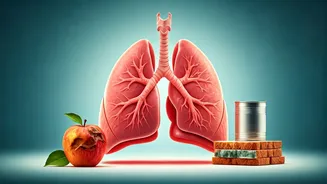Processed Meats
Processed meats, often loaded with nitrates and nitrites, pose a threat to your lungs. These additives, used for preservation and color enhancement, can
trigger inflammation in the respiratory system. Inflammation is detrimental to lung health, potentially contributing to conditions like chronic bronchitis and asthma. Think of bacon, sausages, and deli meats, which should be consumed sparingly. Furthermore, when these foods are cooked at high temperatures, they can release harmful compounds. Limiting the intake of processed meats and choosing fresh, unprocessed alternatives can significantly benefit your lung health, thereby promoting better respiratory function and overall well-being.
Sugary Drinks
Sugary drinks are linked to increased inflammation throughout the body, including the lungs. Consuming sugary beverages such as sodas and sweetened juices can exacerbate respiratory conditions. The high sugar content promotes the production of inflammatory molecules, making it harder to breathe. Also, the added sugars tend to weaken the immune system, making your body more susceptible to respiratory infections. Cutting back on these drinks and opting for water, herbal teas, or naturally flavored beverages is a simple yet effective way to protect your lungs. This switch helps maintain a healthy respiratory system, offering relief from inflammation and potential complications associated with sugar intake.
Excess Salt
Excessive salt consumption can lead to fluid retention, which can place added strain on your lungs. When the body retains fluids, it can make breathing more difficult and may worsen existing respiratory conditions. High-sodium diets can also increase the risk of inflammation, further impairing lung function. This includes foods with high salt content such as fast food, canned soups, and salty snacks. Being mindful of your sodium intake, along with choosing fresh, unprocessed ingredients, is crucial. It supports your lung health by reducing fluid retention and preventing inflammatory responses, ensuring your respiratory system functions at its best.
Dairy Products
Dairy products may cause an increase in mucus production in some individuals, which can make it harder to breathe. This is particularly true for people with asthma or other respiratory sensitivities. The thicker mucus can clog airways, triggering coughing and discomfort. While dairy doesn't affect everyone the same way, paying attention to how your body reacts is important. Considering alternatives like almond or soy milk can help to reduce mucus production if dairy is a trigger. Monitoring your body's response, or even consulting a doctor, to dairy products and making necessary dietary adjustments can play a vital role in managing your respiratory health, and promoting easy breathing.
Fried Foods
Fried foods, particularly those cooked in unhealthy oils, can be problematic for lung health. When fats break down during frying, they can create harmful compounds that can irritate the respiratory system. These foods may trigger inflammation and increase the risk of respiratory issues. The high-fat content in fried food can also contribute to weight gain, which puts additional strain on the lungs. Opting for baked, grilled, or steamed alternatives can significantly help to protect your lung health. Prioritizing healthier cooking methods and limiting your intake of fried foods is beneficial in promoting better breathing and supporting overall respiratory wellness.
Refined Carbohydrates
Refined carbohydrates, found in white bread and pastries, can contribute to inflammation, similar to the effects of sugary drinks. Foods made with white flour and similar ingredients often lack essential nutrients and can lead to blood sugar spikes. These fluctuations can trigger an inflammatory response in the body, which can be detrimental to lung health. Choosing whole-grain alternatives helps to provide sustained energy. Replacing refined carbohydrates with nutrient-rich options supports lung health by reducing inflammation and promoting overall well-being. This will lead to better respiratory function.
Alcoholic Beverages
Excessive alcohol consumption can negatively impact lung health. Alcohol can impair the immune system, making it more difficult for your body to fight off respiratory infections. Heavy drinking can also lead to inflammation in the lungs. It may exacerbate conditions such as asthma. Drinking in moderation is key, to protect your lung health. Limiting your alcohol intake, and staying hydrated are important steps in helping to maintain healthy lungs and a strong respiratory system. Paying attention to your alcohol consumption habits is a vital factor in promoting healthy and comfortable breathing.











